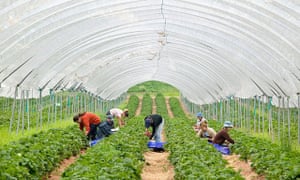The price of British strawberries could rise by more than a third if the UK cannot ensure access to European workers after Brexit, farmers have warned, theguardian is reporting.
Producers have called on the government to introduce a permit scheme for seasonal workers to ensure that the expansion of soft fruit production in the UK is not brought to a halt.
According to the guardian reporter, a report commissioned by industry trade body British Summer Fruits estimates that if UK-based producers are forced to move their operations to countries within the EU to ensure access to labour, the price of strawberries will rise from around £2 per 400g punnet to £2.75 – a jump of 37%. Similarly, replacing homegrown raspberries with imported fruit would see the price of a 200g punnet jump 50% from £2 to £3.
The soft fruit industry, which supplies raspberries, strawberries, blackberries and blueberries, is now worth more than £1.2bn, up 131% in the past 20 years, largely because of a rise in homegrown strawberry production. In 1996 we ate 67,000 tonnes of strawberries a year, and by 2015 this had leapt to 168,000 tonnes – a rise of 150%.
Farmers say access to EU workers is vital to sustain the industry as more than nine out of 10 seasonal pickers and packers of British soft fruit currently come from the European Union, primarily Poland, Bulgaria and Romania. Demand for seasonal staff is expected to rise to around 31,000 by 2020 if the industry continues to grow at the same pace.
The soft fruit industry is one of the UK’s biggest users of EU seasonal labour as it is harder to mechanise the handling of its delicate and tricky-to-pick produce, but its warnings echo those of the wider farming community.
Andrea Leadsom, the former secretary of state for the environment, food and rural affairs who was succeeded by Michael Gove this month, had suggested that farmers invest in machinery to boost productivity. But farmers say appropriate technology requires heavy investment and will not be a solution in the short term.
In the report by theguardian.com, Laurence Olins, chairman of British Summer Fruits, which accounts for 97% of all berries supplied to UK supermarkets, said: “This is as extreme as it gets. If we do not have the pickers, we do not have a soft fruit industry.
“It is inconceivable that people who voted to leave the European Union wanted to destroy an iconic and incredibly competitive British horticulture industry. And there is no letup in the demand. Sales continue to increase year on year.
“But if we cannot ensure access to the seasonal workers needed to produce soft fruit in Britain, that will be an unintended consequence of Brexit – along with soaring prices and increased reliance on imports.”
David Kay, of Hall Hunter Partnership, a grower for Waitrose, Marks & Spencer and Tesco that employs about 3,000 seasonal labourers from 20 different countries, said he had tried to recruit British workers but had found it difficult. “We have worked with job centres and with ex-prisoners, but British people don’t want to do these jobs,” he said.
British Summer Fruits says the industry is already suffering form labour shortages as the fall in the value of the pound has reduced take-home pay for EU nationals, while some feel less welcome or even fear being attacked since the Brexit vote.
Fruit producers say labour shortages are now at their worst level since before 2004, when people from the Czech Republic, Estonia, Hungary, Latvia, Lithuania, Poland, Slovakia and Slovenia were given the right to work in the UK.











When applause travels faster than hunger